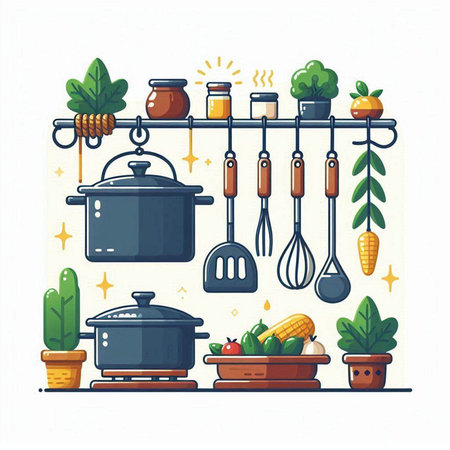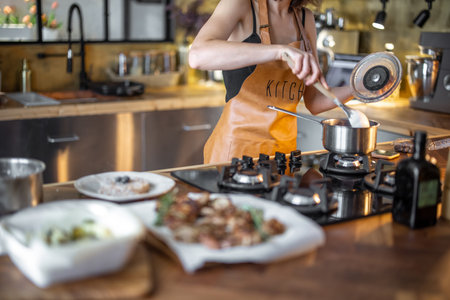Understanding Feng Shui Principles in a British Context
Feng Shui, an ancient Chinese practice centred on harmonising individuals with their surrounding environment, has found a receptive audience far beyond its origins. In the UK, where kitchens are often compact and serve as both functional and social hubs, applying Feng Shui principles can yield significant benefits, particularly for those seeking to enhance prosperity and well-being. While traditional British kitchens may differ in layout and cultural expectations compared to their Eastern counterparts, the fundamental concepts of energy flow, balance, and purposeful arrangement remain highly adaptable. Embracing these ideas involves more than simply rearranging furniture; it requires a thoughtful approach that respects both the practical constraints and unique charm of British homes. By blending classic Feng Shui wisdom with the distinctive characteristics of local architecture—such as galley kitchens, Victorian terraces, or contemporary flats—homeowners can create spaces that foster abundance without sacrificing authenticity or comfort. This introduction sets the stage for exploring how small British kitchens can be transformed into vibrant centres of wealth energy through mindful design and cultural sensitivity.
Common Challenges in Small British Kitchens
Small British kitchens are often a charming blend of history and practicality, but they present unique challenges when seeking to optimise them for Feng Shui wealth benefits. Many homes across the UK, especially Victorian terraces or Edwardian semis, feature compact kitchen spaces shaped by the era’s architectural preferences and local building traditions. These constraints can hinder the smooth flow of energy—or “qi”—essential for attracting prosperity and well-being.
To understand these obstacles more clearly, let us consider the key factors that may affect energy flow:
| Challenge | Description | Feng Shui Impact |
|---|---|---|
| Limited Space | British kitchens are often smaller than their continental or American counterparts, with limited counter space and storage. | Restricted movement and clutter accumulation can block wealth-attracting energy. |
| Architectural Quirks | Unusual layouts, alcoves, low ceilings, or awkwardly placed doors/windows are common features. | These quirks disrupt harmonious energy flow and may create stagnant pockets where positive qi cannot circulate. |
| Traditional Features | Elements like range cookers, deep sinks, and dark cabinetry nod to British heritage but can dominate small spaces. | Bulky fixtures may overwhelm the room’s balance, impeding energetic circulation vital for prosperity. |
Moreover, many British kitchens serve multiple purposes—acting as utility rooms, dining spaces, or even back entrances. This multifunctionality adds further complexity to maintaining order and clarity within the environment. The presence of large appliances squeezed into tight quarters can result in cluttered worktops and obstructed pathways. Additionally, period properties may have original features such as fireplaces or pantries that, while full of character, require creative solutions to integrate harmoniously with modern living and Feng Shui principles.
Ultimately, while these challenges are distinctly British in flavour, they provide an opportunity to blend tradition with mindful adaptation. By recognising the specific obstacles posed by our homes’ architectural heritage and size limitations, we can begin to craft tailored solutions that invite greater wealth and abundance into our everyday lives through thoughtful kitchen design.

3. Optimising Layout for Positive Chi
Maximising positive chi within a small British kitchen begins with a thoughtful reconfiguration of appliances, furnishings, and storage solutions. In the context of compact UK homes—where kitchens often double as communal hubs—every inch counts. Begin by ensuring that the cooker, sink, and refrigerator are arranged in a harmonious triangle, allowing for smooth workflow and unimpeded movement. Avoid placing these key elements directly opposite each other or blocking doorways, as this can disrupt energy flow and create a sense of confinement.
Consider built-in or slimline appliances to preserve valuable space and prevent overcrowding. Integrated storage, such as pull-out larders and corner carousels, helps to eliminate clutter—a critical aspect for fostering vibrant chi. Open shelving can be used sparingly to display items that inspire joy or prosperity, but avoid overfilling them, as too many objects can stagnate energy.
For furnishings, opt for rounded edges rather than sharp corners; this subtle adjustment not only enhances safety in tight spaces but also encourages the gentle circulation of energy. If space allows, a small table or breakfast bar should be positioned so it does not obstruct pathways. Folding furniture or wall-mounted drop-leaf tables offer flexible solutions for mealtimes without compromising flow.
Finally, ensure that cabinet doors and drawers open smoothly without colliding into one another. Each element should serve both function and form—contributing to an environment where positive chi can meander freely throughout the kitchen, inviting abundance and wellbeing into your British home.
4. Material Choices and Colour Schemes
When adapting a small British kitchen to maximise Feng Shui wealth benefits, the thoughtful selection of materials and colour schemes is vital. The UK has a rich tradition of blending classic and contemporary finishes, and these can be harmoniously integrated to encourage the flow of abundance in your home. Both visual appeal and energy balance should be considered when making these choices.
Popular British Materials for Wealth-Enhancing Kitchens
The following table outlines materials commonly found in UK kitchens that also align with Feng Shui principles for prosperity:
| Material | British Popularity | Feng Shui Benefit |
|---|---|---|
| Natural Wood (oak, ash) | High | Warmth, growth, grounding energy |
| Polished Stone (granite, quartz) | Medium-High | Stability, strength, wealth accumulation |
| Ceramic Tiles (Victorian patterns) | Medium | Protection, balanced energy flow |
| Brushed Brass Fixtures | Growing Trend | Metal element for clarity and financial precision |
Colour Schemes That Promote Prosperity
The palette you choose sets the mood and energetic tone. In British interiors, subtlety is often favoured alongside nods to tradition. Below are recommended colours and their Feng Shui associations:
- Sage Green: Symbolises renewal and growth; aligns with the wood element and is reminiscent of the British countryside.
- Creamy Whites: Reflects purity and cleanliness; enhances light in compact spaces.
- Navy Blue: Represents depth and trust; brings an air of stability while staying on trend in the UK.
- Mellow Yellows: Invites cheerfulness and optimism, echoing the warmth of a traditional English cottage kitchen.
Pairing Materials with Colours for Maximum Effect
The synergy between materials and colours can amplify positive energy. For example, pairing oak cabinetry with creamy white walls creates both a sense of expansion and groundedness—essential in smaller spaces. Incorporate metallic accents like brushed brass handles or taps to introduce the metal element associated with financial clarity.
It is best to avoid overly dark hues or stark contrasts that might disrupt the harmonious flow. Instead, opt for gentle transitions between tones to maintain a welcoming atmosphere.
A Balanced Approach for Modern British Homes
Selecting finishes rooted in local culture—such as reclaimed wood or patterned tiles—while considering Feng Shui’s elemental guidance ensures your kitchen not only feels authentically British but also serves as a source of ongoing abundance. Thoughtful choices in materials and colours lay the foundation for a kitchen that supports wellbeing and prosperity in everyday life.
5. Incorporating Iconic British Elements with Feng Shui
Blending the charm of quintessentially British kitchen design with the wisdom of Feng Shui creates a space that feels both familiar and energetically prosperous. Consider, for instance, the classic Aga cooker—a symbol of warmth and abundance in many UK homes. Placing your Aga or any central cooking appliance in a commanding position allows you to see the door while preparing meals, aligning with Feng Shui’s “command position” principle to attract wealth and opportunity. For those with country-style cabinetry or Shaker doors, choose natural wood finishes and soft heritage hues like sage or duck egg blue; these colours echo the Five Elements theory and encourage nourishing energy flow.
Open shelving—so popular in British cottage kitchens—can be harmonised with Feng Shui by displaying only items that spark joy and represent prosperity, such as polished copper pots or vintage teapots. Avoid cluttered shelves, as disorder disrupts chi and can hinder financial luck. Integrate glass-fronted cabinets to reflect light and double the perceived abundance of food stocks, subtly inviting plenty into your life.
Even small touches like brass handles, ceramic knobs, or traditional butler sinks can enhance positive energy when placed thoughtfully. Opt for rounded corners on tables and worktops to soften harsh lines, ensuring energy moves gently through your kitchen. By thoughtfully combining these iconic British elements with mindful Feng Shui remedies, you create a space where tradition meets intention—and where wealth has every chance to flourish.
6. Decluttering and Organisation Tips
Keeping a small British kitchen tidy is not just a matter of aesthetics, but a vital step in attracting wealth according to Feng Shui principles. In homes across the UK, space often comes at a premium, making clever organisation essential. Begin by clearing out any expired foods, chipped crockery, or unused appliances, as stagnant or broken items can block the flow of positive energy and wealth. Embrace the British tradition of recycling by sorting glass jars, plastics, and tins into designated bins – not only does this keep your kitchen clutter-free, but it also aligns with a sustainable lifestyle valued across the country. For storage solutions that suit British kitchens, consider wall-mounted shelves for spices and dry goods or make use of under-cabinet hooks for mugs and utensils. Invest in stackable containers that fit snugly into narrow cupboards, freeing up precious counter space. Drawer dividers can help organise cutlery and utensils, ensuring everything has its place and reducing visual chaos. If you’re dealing with a galley kitchen common in Victorian terraces or compact flats, look for pull-out larders or slimline storage units that maximise vertical space. Remember to keep your worktops as clear as possible – according to Feng Shui, this allows energy to circulate freely and invites prosperity into your home. Finally, make tidying a daily habit; even a quick five-minute routine every evening can maintain order and foster an inviting atmosphere where good fortune feels welcome.
7. Plants, Lighting, and Final Touches
Bringing the final elements into your small British kitchen is essential for both authentic Feng Shui practice and creating a welcoming, wealth-attracting space. The use of plants, lighting, and decorative accents should be intentional and rooted in both tradition and local sensibility.
Plants for Prosperity
In the context of British homes, classic houseplants such as the spider plant or English ivy are not only easy to care for but are also associated with vitality and good fortune. For a more direct nod to prosperity, consider the jade plant (often called the “money plant”), which is believed in Feng Shui to attract abundance. Place these in bright corners or on window sills, where they can flourish without cluttering valuable workspace. Avoid thorny plants like cacti, as their sharp energy can disrupt the flow of wealth chi.
Lighting That Invites Abundance
Good lighting is crucial in a small kitchen—both from a practical and Feng Shui perspective. Where possible, maximise natural light by keeping windows clean and free from obstructions such as heavy curtains or overgrown shrubs outside. Supplement with warm-toned LED lighting under cabinets or above worktops to brighten shadowy areas. Consider adding a statement pendant light above your dining nook; in British interiors, glass or metal finishes complement most styles while gently reflecting light around the room, symbolising the circulation of wealth energy.
Decorative Accents with Meaning
Choose accents that resonate with both Feng Shui principles and British character. Ceramic or glass bowls filled with fresh fruit—particularly oranges or apples—are traditional symbols of abundance and look perfectly at home in a UK kitchen. A vintage brass kettle or copper pot displayed on an open shelf nods to classic British style while reinforcing metallic yang energy. If you wish to display art, opt for landscapes or cheerful scenes rather than solitary figures, as these foster a sense of growth and community.
Final Flourishes
The last touches matter: keep surfaces uncluttered but inviting. A simple linen tea towel with a botanical print, a handmade mug on the counter, or a small vase of seasonal flowers adds warmth without chaos. In sum, by thoughtfully selecting plants, optimising lighting, and choosing meaningful decorative items familiar to British households, you’ll create not just a visually pleasing kitchen but one that truly radiates the energy of prosperity.

